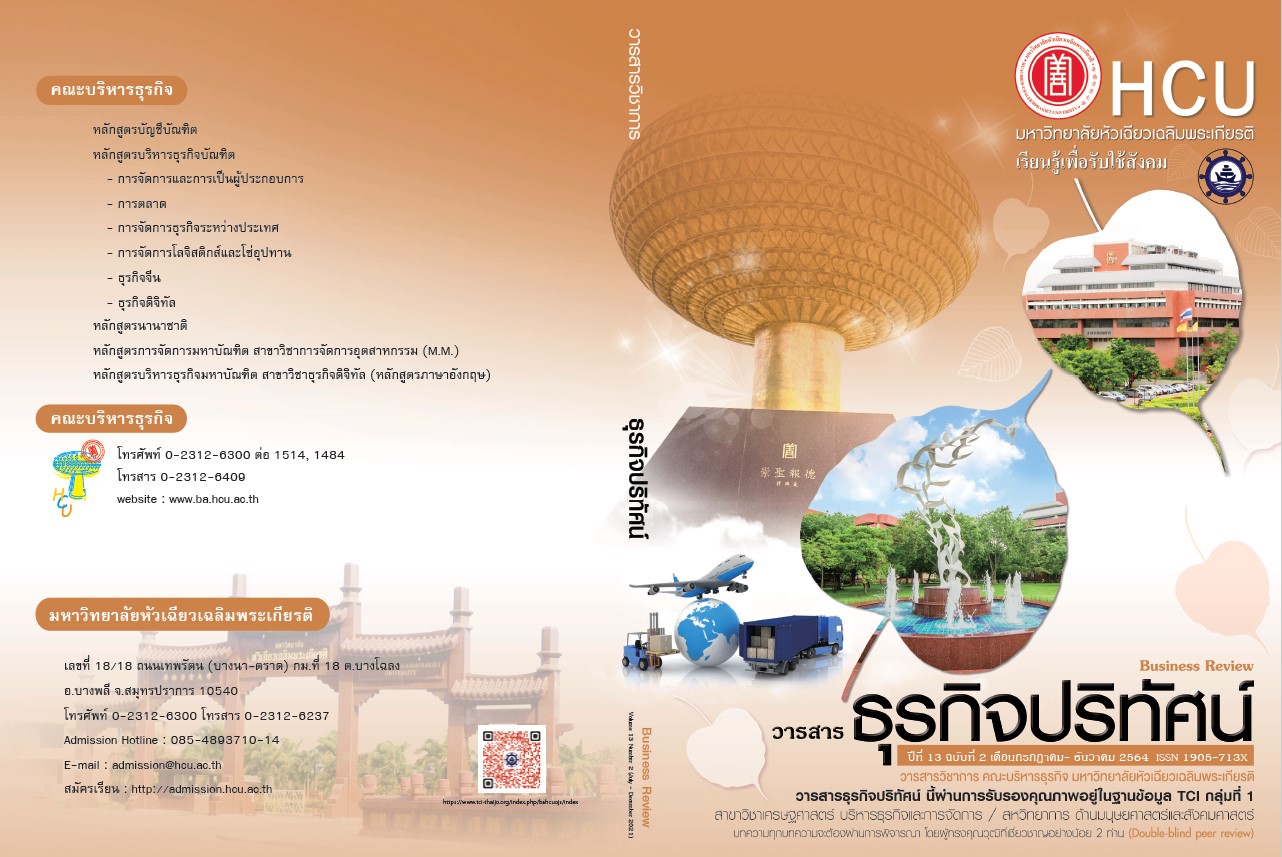The Success of Start-up Business at the Eastern Economic Corridor
Keywords:
Start-up business, Entrepreneurship, Eastern Economic CorridorAbstract
This research aimed at exploring the biography of successful person who run start-up business at the Eastern Economic Corridor, and investigating key success factors in running start-up business at the Eastern Economic Corridor. By employing the qualitative research method, biography and narrative approach, the research results revealed the biography of a key informant which was personal characteristics such as the education background aligned with the start-up business, entrepreneurship motivation, leadership, and creative thinking. These personal characteristics were one of the key success factors in running start-up business at the Eastern Economic Corridor. In addition, business context such as support from the related agencies, networking, teamwork, appropriate period of time, customer oriented, and continuous product improvement were another key success factor.
References
กฤษยา มะแอ และกฤษณา ฝังใจ (2561). ปัจจัยสู่ความสำเร็จของวิสาหกิจเริ่มต้น (สตาร์ทอัพ) ในประเทศไทย. วารสารมหาวิทยาลัยพายัพ, 28 (2), 143-158.
กานต์ชนก บุญสุภาพร และภูริพัฒน์ โสภณคีรีรัตน์. (2559). การลงทุน Startup อย่างไรไม่ให้ Stop. สืบค้น เมื่อ 1 เมษายน 2561, จาก SME Startup เว็บไซต์: https://www.scbeic.com/th/ detail/ product/2506
โครงการพัฒนาธุรกิจนวัตกรรมรายใหม่ มหาวิทยาลัยศิลปากร. (2561). กิจกรรม Startup Thailand League 2018. สืบค้นเมื่อ 22 เมษายน 2561, จาก โครงการพัฒนาธุรกิจนวัตกรรมรายใหม่ มศก. เว็บไซต์: http://www.startup.su.ac.th/? page_id=203
จำเนียร จวงตระกูล. (2553). การวิจัยเชิงคุณภาพ: เครื่องมือการสร้างองค์ความรู้เพื่อการพัฒนาประเทศ. กรุงเทพฯ: ศูนย์กฎหมายธุรกิจอินเตอร์เนชั่นแนล.
ชัยวัฒน์ ใบไม้. (2560). สตาร์ทอัพ: นิยามความสำคัญ และแนวทางการวิจัย. วารสารนักบริหาร, 37(2), 10-21.
ณัฐนัย ตรีเนตรสัมพันธ์ และ สุทัศน์ รัตนเกื้อกังวาน. (2559). การพัฒนาโมเดลธุรกิจด้วยวิธีการลีนสตาร์ทอัพ. วารสารวิจัยและพัฒนา มจธ. 39(3), 337-351.
ณฤทธิ์วรพงษ์ดี. (2560). SET Your Startup Business Guide รู้จักธุรกิจสตาร์ทอัพ. กรุงเทพฯ: ตลาดหลักทรัพย์แห่งประเทศไทย.
เทคซอส. (2560). ‘สตาร์ทอัพไม่ใช่งานกลุ่ม’ เรื่องเล่าที่ผู้ก่อตั้งฝากถึงคนที่ (จะ) กำลังทำสตาร์ทอัพ. สืบค้นเมื่อ 22 สิงหาคม 2562, จาก Techsource เว็บไซต์: https://techsauce.co/saucy-thoughts/startup-is-not-side-project/
พีระพงษ์ เอื้อสุนทรวัฒนา. (2560). บทบาทของผู้นำในการบริหารธุรกิจ. วารสารธุรกิจปริทัศน์, 9(2), 1-6.
สำนักงานคณะกรรมการนโยบายเขตพัฒนาพิเศษภาคตะวันออก. (2562). โครงการพัฒนาระเบียงเศรษฐกิจพิเศษภาคตะวันออก (EEC). สืบค้นเมื่อ 4 มิถุนายน 2561, จากสำนักงานคณะกรรมการนโยบาย เขตพัฒนาพิเศษภาคตะวันออก เว็บไซต์: https://www.eeco.or.th/เกี่ยวกับองค์การ/ความเป็นมา
สำนักงานคณะกรรมการวิจัยแห่งชาติ. (2562). แนวทางจริยธรรมการทำวิจัยที่เกี่ยวข้องกับมนุษย์ ฉบับปรับปรุงครั้งที่ 1. กรุงเทพฯ: สำนักงานคณะกรรมการวิจัยแห่งชาติ.
สภาอุตสาหกรรมแห่งประเทศไทย. (2560). รายงานสรุปโครงการศึกษาวิจัย THAILAND ISO STARTUP PROFILE. กรุงเทพฯ: สภาอุตสาหกรรมแห่งประเทศไทย.
สมาคมไทยผู้ประกอบธุรกิจเงินร่วมลงทุน. (2559). สำรวจข้อมูลผู้ก่อตั้งสตาร์ทอัพไทยปี 2016 โดยสมาคม VC ไทย. สืบค้นเมื่อ 1 พฤษภาคม 2562, จาก สมาคมไทยผู้ประกอบธุรกิจเงินร่วมลงทุน เว็บไซต์: https://brandinside.asia/thai-startup-founders-survey-2016/
Andrews, M., Squire, C., & Tamboukou, M. (2013). Doing narrative research. Los Angleles: Sage Publication.
Blank, S., & Drof, B. (2012). The startup owner's manual: The step-by-step guide for building a great company. California: K&S Rabch Inc.
Center of Biographical Research. (2015). Life writing. Retrieved May 21, 2018, from Center of Biographical Research
Website: http://www. hawaii.edu/biograph/about_lifewr.html.
Gabrielsson, J. and Polits, D. (2011). Career motives and entrepreneurial decision-making: examining preferences for causal and effectual logics in the early stage of new ventures. Small Business Economics. 36(3), 281-298.
Lee, J. Y. (2014). Seven hundred days of startup: A day in the life of a medical student in silicon valley, Academic Psychiatry, 38(1), 52–54.
Lieblich, A., Tuval-Mashiach, R., & Zilber, T. (1998). Narrative research: Reading, analysis, and interpretation. Thousand Oaks: Sage Publication.
Mashiach, R., & Zilber, T. (1998). Narrative research: Reading, analysis and interpretation. Thousand Oaks, CA: Sage.
Mansoori, Y., & Lackéus, M. (2019). Comparing effectuation to discovery-driven planning, prescriptive entrepreneurship, business planning, lean startup, and design thinking. Retrieved June 1, 2018, from Springer Professional Website: https://doi.org/10.1007/s11187-019-00153-w
Nabi, G., Holden, R., and Walmsley, A. (2006). Graduate career-making and business start-up: a literature review. Education and Training. 48(5), 373-385
Nastasi, B. K., & Schensul, S. L. (2005). Contributions of qualitative research to the validity of intervention research. Journal of School Psychology, 43(3), 177-195.
Smith, T. (2015). Biographical research: Biography research. Retrieved March 4, 2020, from University of Wisconsin library Website: https://guides.library.uwm.edu/biography
Swamidass, P.M. (2013).University startups as a commercialization alternative: lessons from three contrasting case studies. The Journal of Technology Transfer, 38(6), 788–808.
Downloads
Published
How to Cite
Issue
Section
License
All articles published in the Business Administration and Management Journal Review are copyrighted by the journal.
The views and opinions expressed in each article are solely those of the individual authors and do not represent those of Huachiew Chalermprakiet University or any other faculty members. Each author is fully responsible for the content of their own article. Any errors or issues found are the sole responsibility of the respective author.




